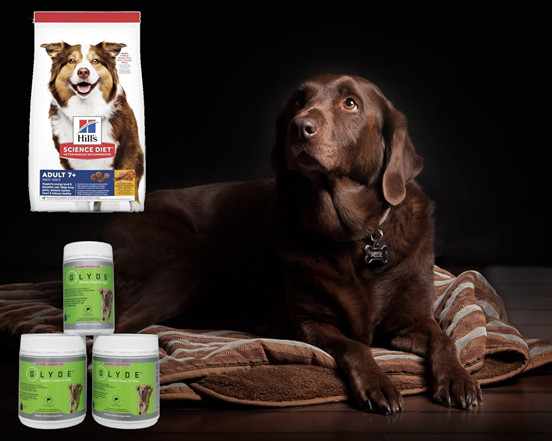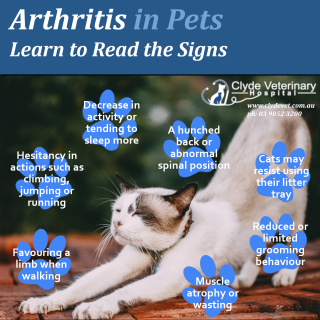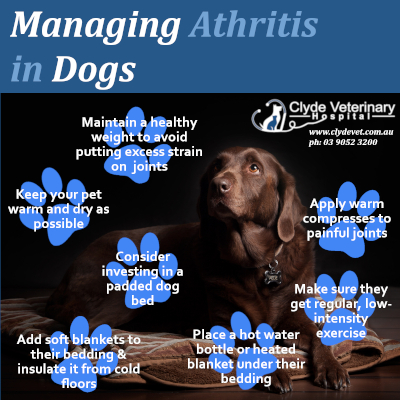Winter is Arthritis Season – Symptoms to Watch For in Your Pet

As the cold Melbourne winter mornings set in, Dr Mitry takes a look at the preventative steps you can take to help diagnose and manage arthritis in our furry friends.
Arthritis in Pets – A Silent Epidemic
Our pets aren’t always the best communicators. Any sign that an animal is in pain can be interpreted as a sign of weakness by a competitor, so our furry companions try naturally to avoid displaying any outward pain symptoms. Cats are particularly skilled at hiding their pain.
But research shows that 80% of dogs experience some form of arthritis by eight years of age and a startling 20% show some symptoms at just one year, and the numbers are not radically different for cats. There’s no question that arthritis is one of the most under-diagnosed of veterinary conditions.
Arthritis can affect one or more joints anywhere in your pet’s body, but the most common joints affected in dogs and cats are the hips, knees, shoulders and elbows. Most of these joints depend on a layer of cartilage acting as a cushioned surface so the adjoining bones can move freely. This movement is assisted by the lubrication provided by synovial fluid in joints.
With arthritis the cartilage deteriorates and the synovial fluid loses its lubricating properties so that movement of the bones causes friction in the joint which registers as pain, and that pain will worsen as the joint becomes more aggravated.
Arthritis is an incurable condition, but the worst symptoms can be managed to give your pet a relatively pain-free old age, and the earlier the condition is identified the better the prospects for effective management.

Spotting Arthritis in Your Pet
Fortunately nobody knows them as well as their owner, and there are several obvious signs to watch out for as your pet ages. If your dog or cat is showing any of these possible symptoms of arthritis over a persistent time frame, we recommend seeing your vet as early as possible for a full diagnosis.
- Slowness in getting up
- Favouring a limb when walking
- Hesitancy in actions they previously had no problem with (climbing steps, jumping up, running)
- Decrease in activity or play
- Laying down/sleeping more
- Muscle atrophy/wasting
- A hunched back or abnormal spinal position
- Cats may resist using their litter tray
- Reduced or limited grooming behaviour
- Irritability when handled, especially in cats
Dog owners can scroll down to the end of this article for an interactive online quiz that you can take to help assess the risk of osteoarthritis in your dog.

Managing Your Pet’s Arthritis At Home
As another Melbourne winter intensifies, the mornings are colder, and the potential for any flare up in your dog or cat’s arthritis is heightened. You can help out by making sure their bedding is warm and clean and well insulated from the cold floor. Some other things you can do to help manage the condition include;
- Maintain a healthy weight to avoid putting excess strain on arthritic joints
- Controlled, low-intensity exercise is essential, but make sure you carefully monitor your pet while they play, walk, or run. If possible, find a soft surface for activity such as a grassed area
- Keep your pet warm and dry, since cold and damp conditions can aggravate arthritis.
- Consider investing in a padded dog bed and apply warm compresses to painful joints.
- Placing a hot water bottle or heated blanket under their bedding can also help relieve their discomfort

Most importantly, for dogs or cats with severe arthritis, you should consider what changes you can make to their home environment to reduce the stress on ageing joints – this could include re-locating their food and water bowls, or providing a ramp to help them access their bedding.


